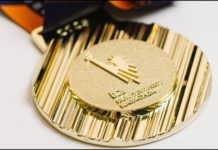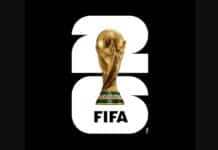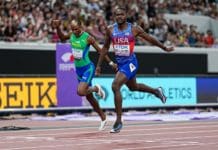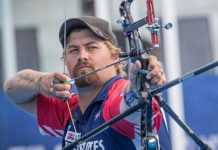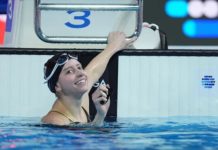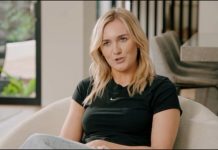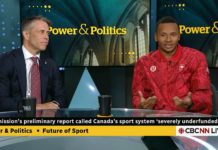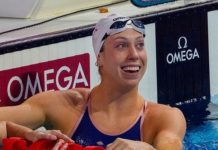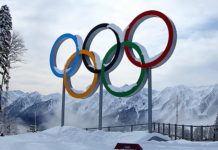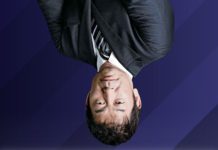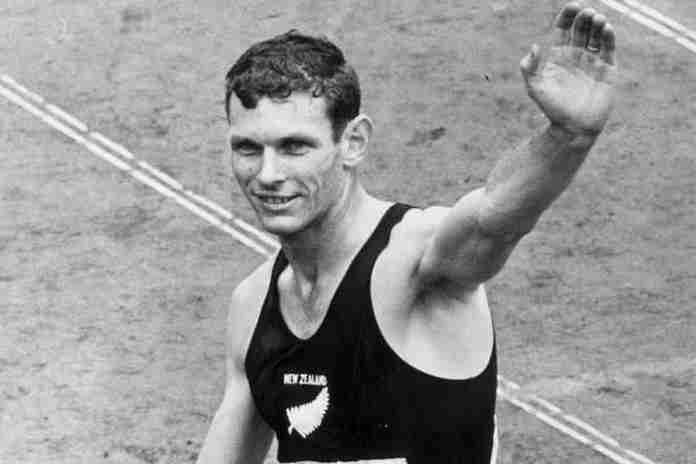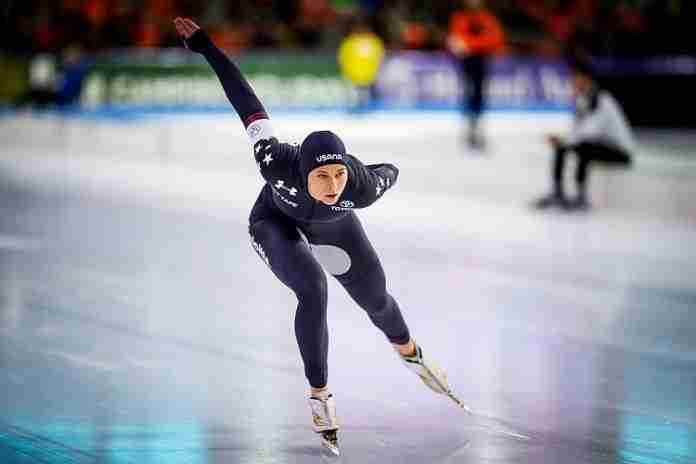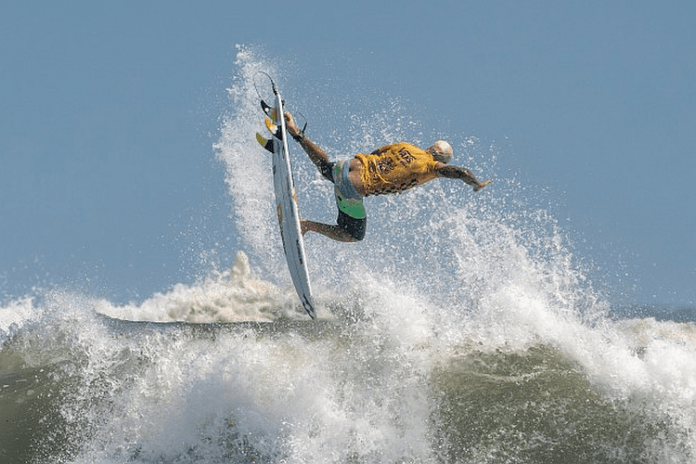There’s the NFL heading toward the playoffs and the baseball Hot Stove League is on fire right now, but in the Olympic world, all anyone seems to talk about is Russia and whether the World Anti-Doping Agency’s sanctions were appropriate.
The latest to weigh in was the U.S. Olympic & Paralympic Committee, whose Board of Directors met in New York on Friday. Board chair Susanne Lyons and Chief Executive Sara Hirshland had a short conference call with news media while waiting to fly out, and most of the discussion was about Russia.
Said Lyons:
“I wanted to take a moment to comment a little bit on some of the important news that came out this week. The whole sporting world, I think, was awaiting the WADA recommendations regarding the doping sanctions for Russia.
“We had a good discussion, a robust discussion in our Board, and I think here kind of reflects what the Board’s feeling was. One of the foundational anchors of the Olympic and Paralympic Games is certainly the staunch defense of fairness and ensuring a level playing field. And doping and corruption should never have a place in the Games. The world’s athletes have a right to know that they are competing against clean opponents. And these repeated failures of Russia to comply with the WADA Code truly demands the strongest sanctions.
“So we support WADA’s recommendations. We’re hopeful that the Court of Arbitration for Sport, on the assumption it will be appealed, will keep those bans in place. And, you know, I think a concern we have is that considering the data manipulations that occurred right up until the 11th hour of WADA’s investigations, it’s going to be incredibly difficult for clean Russian athletes to prove their innocence, and therefore it is very difficult for us to see how justice can be served, and how there will be a true deterrent against future corruption if any of the athletes from Russia have a right to compete at Tokyo under any flag, neutral or otherwise.
“And, put simply, the past sanctions have not been effective and we simply can’t afford a similar outcome once again. So we very much support WADA’s sanctions and will continue to watch this with great interest.”
She was asked an excellent follow-up question by Ed Hula of AroundTheRings.com, about the discussions on this topic at the Olympic Summit in Lausanne, which took place on 7 December, prior to the WADA sanctions announcement on 9 December. The concluding statement from the meeting said that “It was stressed by the participants that full justice must be finally done so that the guilty ones can be properly punished and the innocent ones are fully protected.”
Lyons attended the Summit and added some important details of the discussions:
“I think there was a lot of agreement that those who are guilty need to have punishment, that there should be strong and firm sanctions, and I think there was pretty good unanimity around that.
“I think where there was some concern is that how do you – if there are innocent athletes in Russia – you know, can they participate, and I think the real question is how will we know? If the data truly has been corrupted, which it seems that the reports would indicate that it has, it’s very unclear how you can decide and siphon out who has been part of the doping and who has not. So I think there was not necessarily unanimity on that. I there are some who think that athletes should be able to compete if they can be proven clean; I think it’s just difficult to know how that proof would be obtained.
“As you said, my counterpart from Russia [Stanislav Pozdnyakov] was recused from that conversation. They did have a statement, and I think they do not necessarily see their culpability in this the same way that perhaps others do, and again, since he was not in the room, he was not part of that conversation.”
David Wharton of the Los Angeles Times further asked Lyons about the request for a complete ban on Russian participation from some athlete groups. Her response included:
“It’s a difficult question. It’s a balancing between the right to compete, and a clean athlete’s right to do so, and the balance, knowing that this data is not clean and that it is going to be very difficult for someone to ascertain whether an athlete is, in fact, clean or not. And I know that there are those who are proposing a blanket ban.
“I think if there is a way that it is able to determine that there are Russian athletes who are clean, we would support their right to compete. I think we just find it challenging to understand how that will happen for many of those athletes. … If they can’t prove that they are clean, they shouldn’t compete.”
In Russia, the TASS news agency continued posting stories about the domestic reaction to the sanctions. Last Friday, Kremlin spokesman Dmitry Peskov said any discussion of an “alternative” event to the Olympic Games “is a question to our sports authorities. This issue is not discussed in the Kremlin.” The idea has been surfaced by Russian Federation Council Speaker Valentina Matviyenko earlier in the week.
So, did anything else happen, anywhere in the world of Olympic sport? Actually, yes, and some quite important:
● At the same Olympic Summit, a “two-speed” approach was suggested for working with eSports and gaming. For electronic sports which simulate existing sports – such as football – there is “great potential for cooperation and incorporating them into the sports movement,” but not so much for other games. For those programs, “ the sports movement should focus on players and gamers rather than on specific games.” That’s a pretty clear message going forward.
● At the first regional SportAccord Conference, held in Ft. Lauderdale, Florida, the eSports issue was also highlighted. The summary of the event included:
“GAISF Director Philippe Gueisbuhler also took to the stage during the panel session on the emergence of esports and spoke about the challenges and opportunities for traditional sport.
“‘This train is already on the move, it is not a question of stopping esports,” Gueisbuhler said. ‘It is there and will continue to grow, our kids and young people are on board and all we can do is try to bring it in the right direction.
“‘We need to have a look at how people can use it as a balance between real sport, work and have a bit of fun, as well as making a competition out of esports. It is a question of balance.’”
The choice of words on “real sport” vs. eSports was interesting and worth noting for the future.
● International Olympic Committee chief Thomas Bach continued his campaign to free sport from political interference. The Olympic Summit declaration included:
“[T]he participants expressed serious concerns over the growing politicisation of sport. Examples include: governments calling on athletes and teams not to participate in competition in specific countries; calls for boycotts; the non-issuance of visas for athletes wanting to participate in international competitions; the resistance by organisers to raising particular national flags and to playing national anthems; and the repeated interference of governments in the basic operations of national sports bodies. All these measures disrespect the political neutrality of sport.”
Bach made the same pitch in an address to the United Nations General Assembly last Monday (9th), stating that “We depend on the support of you, the governments, for our mission and our neutrality.”
● Tokyo’s Olympic Stadium for the 2020 Games was officially declared complete on Sunday. The Associated Press noted that “The stadium is sure to be the centerpiece of the 2020 Olympics, built at a cost of 156.9 billion yen, about $1.43 billion at the present exchange rate. The capacity for the Olympics will be 68,000 and can be expanded later to 80,000.”
● A major story from the summer in judo was resolved when the International Judo Federation announced that Saeid Mollaei, the 2017 World 81 kg Champion, will compete for Mongolia. He received confirmation of his Mongolian citizenship earlier this month.
Mollaei, born in Iran, had been ordered to lose a match at this year’s World Championships in order not to have to fight Israeli star Sagi Muki, who eventually won the world title at 81 kg. Fearing for his safety, he fled to Germany before making arrangements to compete for Mongolia.
Mollaei competed at the IJF World Tour Qingdao Masters in China on the weekend in the 81 kg division, but lost in the second round to Christian Parlati of Italy.
● Sad news from Dallas, Texas, where the legendary New Zealand middle-distance star Peter Snell passed away on 12 December, at age 80. He was a triple Olympic gold medalist at the 800 (1960-64) and 1,500 m (1964) and held world records at the 800 m-880 y-1,000 m-mile.
After his running career was over, he moved to the U.S. and graduated from U.C. Davis, then went on to obtain a Ph.D. in Exercise Physiology from Washington State. He became an Associate Professor in the Department of Internal Medicine at the University of Texas Southwestern Medical Center and Director of its Human Performance Center. That’s a true example of a scholar-athlete.
Rich Perelman
Editor
You can receive our exclusive TSX Report by e-mail by clicking here. You can also refer a friend by clicking here.









